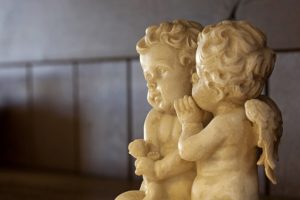The Curious Ending of Mark
Trembling and bewildered, the women went out and fled from the tomb. They said nothing to anyone, because they were afraid.
Mark 16:8
 The ending of the Gospel of Mark presents multiple mysteries. Most English Bibles print several options for the concluding verses of Mark 16, usually with notes that explain the curious manuscript evidence. The oldest manuscripts of Mark end with verse 8, the last words being: “because they were afraid” (ephobounto gar in Greek). The women who had been the first witnesses of the empty tomb and who had been told of the resurrection of Jesus by an angel kept the news to themselves out of fear.
The ending of the Gospel of Mark presents multiple mysteries. Most English Bibles print several options for the concluding verses of Mark 16, usually with notes that explain the curious manuscript evidence. The oldest manuscripts of Mark end with verse 8, the last words being: “because they were afraid” (ephobounto gar in Greek). The women who had been the first witnesses of the empty tomb and who had been told of the resurrection of Jesus by an angel kept the news to themselves out of fear.
Of course this is an ironic ending and that may well have been Mark’s point. We know from the other Gospels and from the longer endings of Mark that the women soon shared what they had experienced with the other disciples of Jesus. Their fear turned to excitement and even boldness as they delivered the good news of the resurrection. This is telling, in that women, whose witness was undervalued in first-century Jewish culture, became the first evangelists of the victory of Jesus over death.
So the original ending of Mark is ironic, in part because the fearful silence of the first witnesses to the resurrection soon became bold proclamation that would change the world. It is also ironic because the first witnesses were people whose voices had been ignored by their culture. Yet they served as a paradigm for the calling of all followers of Jesus: to announce the good news of his victory to the world.
How ironic – and wonderful – that God uses ordinary people like Mary Magdalene, Salome, and Mary the mother of James to deliver his good news. How ironic – and wonderful – that God uses ordinary people like you and me to do the same in our world. May the Lord give us courage to tell the truth about Jesus and the new life that is to be found in him.
QUESTIONS TO CONSIDER:
Have you ever felt afraid to talk with people about Jesus? When? Why?
What helps you to share the good news with others?
PRAYER:
All praise be to you, Lord Jesus, because you were raised from the dead on the third day!
All praise be to you, Lord Jesus, because you defeated death and opened up the way of life!
All praise be to you, Lord Jesus, because you have chosen ordinary people to bear witness to your victory!
All praise be to you, Lord Jesus, because, by your Spirit, you help us to tell the truth about you!
All praise be to you, Lord Jesus, because you are our Savior, our Lord, and our God!
Hallelujah! Amen.
Explore more at the Theology of Work Project online commentary: Drawing Together Some Threads (Mark)

Mark D. Roberts
Senior Strategist
Dr. Mark D. Roberts is a Senior Strategist for Fuller’s Max De Pree Center for Leadership, where he focuses on the spiritual development and thriving of leaders. He is the principal writer of the daily devotional, Life for Leaders,...


